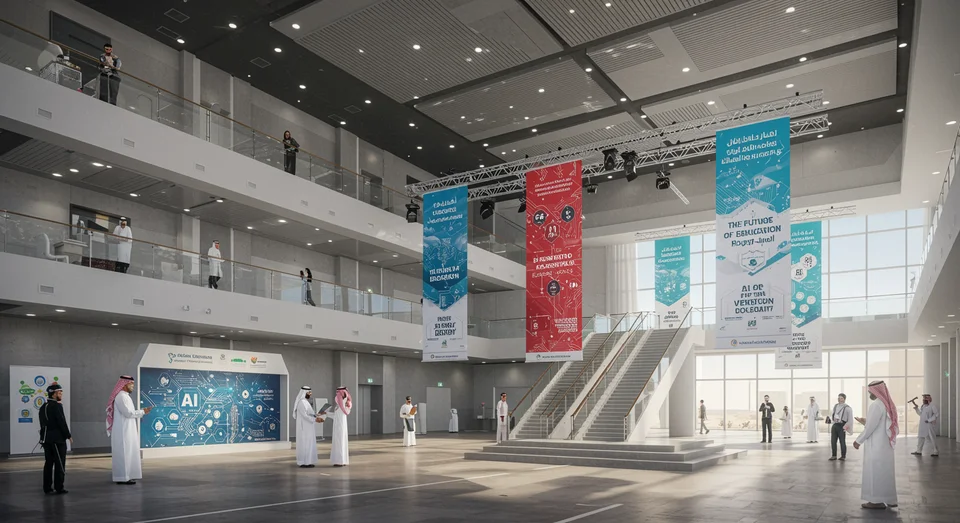Riyadh Roundtable Champions Global AI Literacy for an Inclusive Future
269 views
In the heart of Riyadh, a city that increasingly finds itself at the crossroads of tradition and technological ambition, the Human Capability Development Program (HCDP) convened a ministerial roundtable that sought to address one of the defining challenges of the modern era: preparing humanity for a world shaped by artificial intelligence. Under the banner of the Human Capability Initiative conference and themed #BeyondReadiness, the gathering brought together 20 global ministers and thought leaders from organizations such as the Saudi Data and Artificial Intelligence Authority (SDAIA), the World Bank, and the OECD. Their mission was clear yet ambitious—to chart a course toward universal AI literacy.

AI Literacy: A Global Imperative for Education and Equity
The discussions, centered on the theme "AI Literacy for All," were as forward-looking as they were urgent. With artificial intelligence increasingly permeating every facet of life, from healthcare and finance to education and governance, the need to equip individuals with the skills and understanding to navigate this new terrain has never been more pressing. The roundtable's participants underscored the necessity of embedding AI literacy into national education systems, advocating for its inclusion not as a specialized subject for a privileged few but as a foundational skill akin to reading or arithmetic.
The recommendations put forth were as practical as they were visionary. Beyond integrating AI into curricula, there was a strong emphasis on lifelong learning—on creating pathways for continuous education and reskilling that would allow individuals to adapt to the evolving demands of the labor market. Equally significant was the call for enhanced international collaboration, with a focus on sharing resources and strategies to ensure that access to AI education is not confined to wealthier nations but extended to underserved communities worldwide.
This initiative is deeply rooted in the ethos of Saudi Vision 2030, a transformative agenda that seeks to diversify the Kingdom’s economy and foster sustainable growth through investments in human capital. By prioritizing AI literacy, Saudi Arabia positions itself not merely as a consumer of advanced technologies but as a contributor to the global conversation on how to wield them responsibly and equitably.
The event culminated in a joint statement that captured the collective aspirations of its participants. It outlined a roadmap for achieving equitable access to AI tools and digital training, emphasizing the importance of inclusivity in an era where technological disparities risk exacerbating existing inequalities.
A Broader Perspective on AI Literacy and Global Collaboration
The roundtable’s focus on AI literacy as a universal right rather than a luxury is a reflection of a broader shift in how nations view technology. In an increasingly interconnected world, the ability to understand and leverage AI is no longer confined to the tech-savvy elite; it is becoming a cornerstone of civic participation and economic opportunity. Yet, the challenges are immense. Bridging the digital divide will require not only financial investment but also cultural shifts, as societies grapple with questions of ethics, privacy, and the potential for automation to displace traditional jobs.
What makes the Saudi initiative particularly compelling is its emphasis on collaboration. By bringing together voices from diverse sectors and regions, the roundtable highlighted the interconnected nature of the challenges—and opportunities—posed by AI. It is a recognition that no single nation or organization can address these issues in isolation. The inclusion of global entities like the World Bank and OECD adds weight to the initiative, signaling a commitment to shared solutions in a fragmented world.
In many ways, the conference serves as a microcosm of the broader aspirations of Saudi Vision 2030. It is a vision that seeks to balance technological advancement with human development, recognizing that the true measure of progress lies not in the sophistication of a nation’s algorithms but in the empowerment of its people.
As the world hurtles toward an AI-driven future, the Riyadh roundtable offers a hopeful blueprint for how nations might navigate this transition. It is a reminder that while technology has the power to divide, it also holds the potential to unite—if wielded with foresight, inclusivity, and a commitment to the common good.









